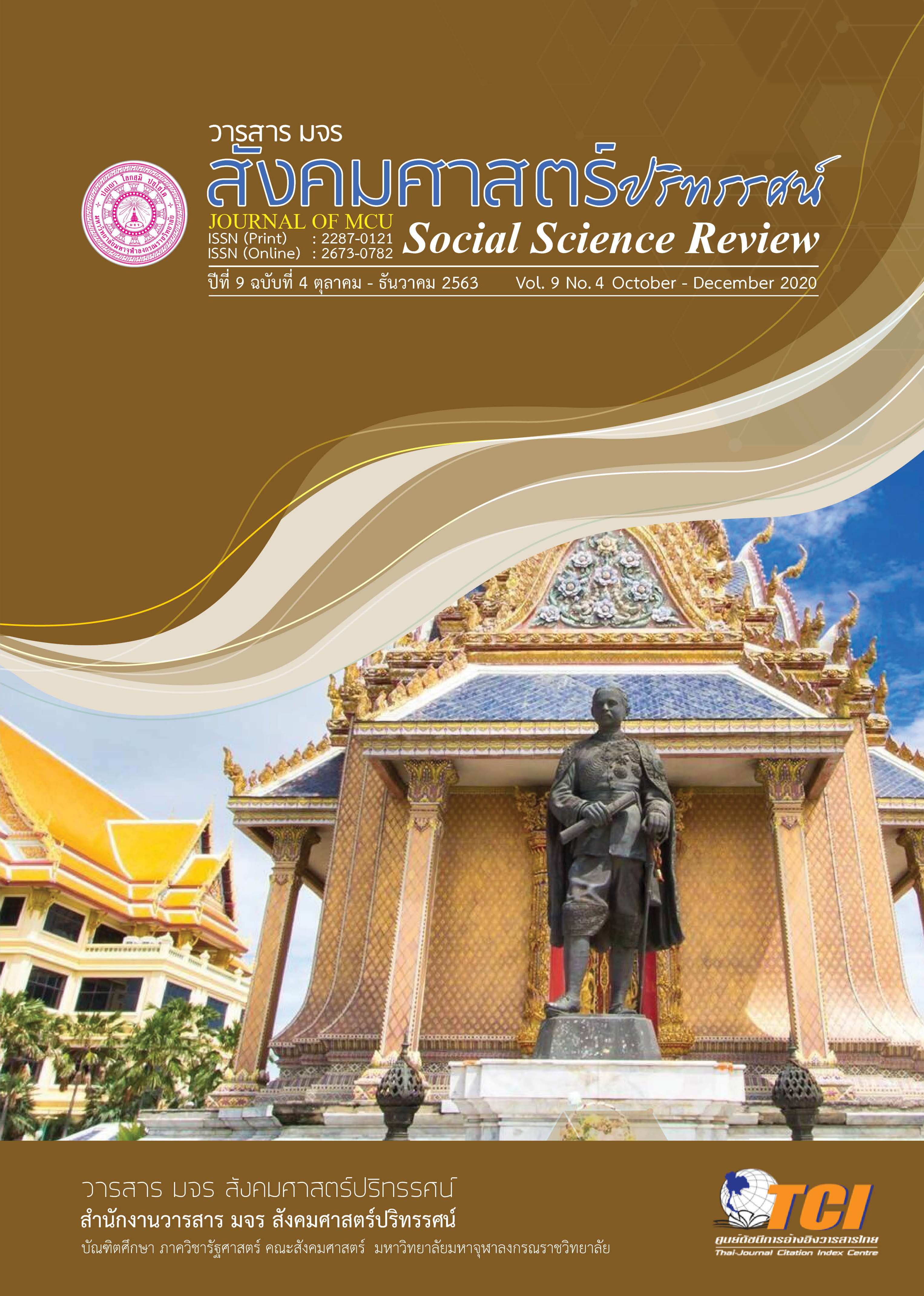การพัฒนาการสร้างความมั่นคงแห่งชาติของหน่วยบัญชาการทหารพัฒนา
คำสำคัญ:
การพัฒนา, การสร้างความมั่นคงแห่งชาติ, หน่วยบัญชาการทหารพัฒนาบทคัดย่อ
บทความวิจัยนี้มีวัตถุประสงค์เพื่อศึกษาการสร้างความมั่นคงแห่งชาติของหน่วยบัญชาการทหารพัฒนา วิเคราะห์หลักธรรม และนำเสนอการพัฒนาการสร้างความมั่นคงแห่งชาติของหน่วยบัญชาการทหารพัฒนา เป็นการวิจัยแบบผสานวิธี ระหว่างการวิจัยเชิงปริมาณเก็บข้อมูลจากกลุ่มตัวอย่าง 394 คน จากแบบสอบถาม วิเคราะห์ข้อมูลสถิติ ค่าร้อยละ ค่าเฉลี่ย ส่วนเบี่ยงเบนมาตรฐาน และการวิจัยเชิงคุณภาพด้วยการสัมภาษณ์เชิงลึกกับผู้ให้ข้อมูลสำคัญ 25 รูปหรือคน วิเคราะห์ข้อมูลแบบอรรถาธิบายและพรรณนา ผลการวิจัยพบว่า 1. การสร้างความมั่นคงแห่งชาติของหน่วยบัญชาการทหารพัฒนามีการดำเนินการสร้าง เส้นทางคมนาคมให้ได้มาตรฐาน สร้างแหล่งน้ำ สร้างอาชีพในชุมชน ส่งเสริมการทำเกษตรแบบแปลง ใหญ่ ทำให้ประชาชนเกิดการรวมกลุ่มและวางแผนอย่างเป็นระบบ 2. หลักธรรมในการพัฒนาการสร้างความมั่นคงแห่งชาติโดยหลักอปริหานิยธรรม 7 เน้นการประชุม ประสานความร่วมมือ จัดทำมติร่วมกัน การให้การยอมรับในตัวประธาน เน้นการสร้างความร่วมมือ การจัดสรรทรัพยากร การใช้สถานที่ที่ตรงกับความต้องการของประชาชนรับฟังข้อเสนอแนะ นำความร่วมมือมาสร้างภูมิคุ้มกันในชุมชน 3. การพัฒนาการสร้างความมั่นคงแห่งชาตินำหลักปรัชญาของเศรษฐกิจพอเพียงสร้างความมั่นคงแห่งชาติแก่ประชาชนพัฒนาต่อยอดการดำรงชีวิตให้เหมาะสม ส่งเสริมสนับสนุนให้ประชาชนรวมกลุ่ม ส่งเสริมอาชีพประชาชน ส่งเสริมการใช้ทรัพยากรที่มีอยู่อย่างจำกัด จัดทำแผนพัฒนาและจัดทำโครงการอย่างเป็นระบบ เพื่อให้เกิดประโยชน์สูงสุดกับประชาชน
เอกสารอ้างอิง
กันต์ อินทุวงศ์. (2556). การประยุกต์หลักการจัดการธุรกิจแบบมีส่วนร่วมของเครือข่ายวิสาหกิจชุมชนตามแนวพระราชดำริเศรษฐกิจพอเพียงเพื่อเสริมสร้างขีดความสามารถของคน ในท้องถิ่นอย่างเป็นระบบและยั่งยืน (รายงานการวิจัย). กรุงเทพฯ: สำนักงานคณะกรรมการวิจัยแห่งชาติ.
กิตติพงศ์ กาญจนาคม. (2560). แนวทางการปฏิบัติงานของหน่วยบัญชาการทหารพัฒนาระยะ 20 ปี (พ.ศ.2560– 2579). (รายงานการวิจัย). กรุงเทพฯ: การป้องกันราชอาณาจักรรุ่นที่ 59.
ฉัตรชัย ศรีเมืองกาญจนา. (2562). การบริหารจัดการด้านความมั่นคงพื้นที่ชายแดนของประเทศไทย. สืบค้น 22 ธันวาคม 2562, จาก https://www.parliament.go.th.
ธนยศ ชวะนิตย์. (2561). รูปแบบกระบวนทัศน์รัฐประศาสนศาสตร์เชิงวัฒนธรรม. วารสาร มจร สังคมศาสตร์ปริทรรศน์, 7(1), 1 – 17.
บุญทัน ดอกไธสง. (2553). ขอบข่ายรัฐประศาสนศาสตร์ยุคโลกาภิวัตน์. กรุงเทพฯ: สำนักพิมพ์ปัญญาชน.
ประยุทธ์ จันทร์โอชา. (2560). แผนเตรียมความพร้อมแห่งชาติ (พ.ศ.2560-2564). กรุงเทพฯ: สำนักงานสภาความมั่นคงแห่งชาติศูนย์ราชการเฉลิมพระเกียรติ.
พระสุธีวีรบัณฑิต (โชว์ ทสฺสนีโย) และคณะ. (2562). รัฐประศาสนศาสตร์เปลี่ยนโลก. วารสาร มจร สังคมศาสตร์ปริทรรศน์, 8(2), 300-314.
พัชรินทร์ สิรสุนทร. (2556). แนวคิด ทฤษฎี เทคนิคและการประยุกต์เพื่อการพัฒนาสังคม.กรุงเทพฯ : สำนักพิมพ์แห่งจุฬาลงกรณ์มหาวิทยาลัย.
พิชิต ปุริมาตร. (2559). รัฐศาสตร์กับการเมืองการปกครองของไทย. นครราชสีมา: หจก.ทัศน์ทองการพิมพ์.
ภาส ภาสสัทธา. (2558). การบูรณาการหลักพุทธธรรมเพื่อความโปร่งใส ในการบริหารจัดการขององค์กรปกครองส่วนท้องถิ่น (ดุษฎีนิพนธ์พุทธศาสตรดุษฎีบัณฑิต สาขารัฐประศาสนศาสตร์). พระนครศรีอยุธยา: มหาวิทยาลัยมหาจุฬาลงกรณราชวิทยาลัย.
โรงเรียนเสนาธิการทหารบก. (2562). ภารกิจของกองทัพบก. สืบค้น 22 ธันวาคม 2562, จาก https://www.rtarf.mi.th/index.php/th.
หน่วยพัฒนาการเคลื่อนที่ 23. (2562). สรุปผลการปฏิบัติงานประจำปีงบประมาณ 2560 – 2562. เลย: หน่วยพัฒนาการเคลื่อนที่ 23.
ดาวน์โหลด
เผยแพร่แล้ว
รูปแบบการอ้างอิง
ฉบับ
ประเภทบทความ
สัญญาอนุญาต
ลิขสิทธิ์ (c) 2020 วารสาร มจร สังคมศาสตร์ปริทรรศน์

อนุญาตภายใต้เงื่อนไข Creative Commons Attribution-NonCommercial-NoDerivatives 4.0 International License.
เพื่อให้เป็นไปตามกฎหมายลิขสิทธิ์ ผู้นิพนธ์ทุกท่านต้องลงลายมือชื่อในแบบฟอร์มใบมอบลิขสิทธิ์บทความให้แก่วารสารฯ พร้อมกับบทความต้นฉบับที่ได้แก้ไขครั้งสุดท้าย นอกจากนี้ ผู้นิพนธ์ทุกท่านต้องยืนยันว่าบทความต้นฉบับที่ส่งมาตีพิมพ์นั้น ได้ส่งมาตีพิมพ์เฉพาะในวารสาร มจร สังคมศาสตร์ปริทรรศน์ เพียงแห่งเดียวเท่านั้น หากมีการใช้ภาพหรือตารางหรือเนื้อหาอื่นๆ ของผู้นิพนธ์อื่นที่ปรากฏในสิ่งตีพิมพ์อื่นมาแล้ว ผู้นิพนธ์ต้องขออนุญาตเจ้าของลิขสิทธิ์ก่อน พร้อมทั้งแสดงหนังสือที่ได้รับการยินยอมต่อบรรณาธิการ ก่อนที่บทความจะได้รับการตีพิมพ์ หากไม่เป็นไปตามข้อกำหนดเบื้องต้น ทางวารสารจะถอดบทความของท่านออกโดยไม่มีข้อยกเว้นใดๆ ทั้งสิ้น





